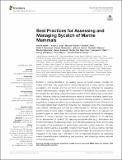Files in this item
Best practices for assessing and managing bycatch of marine mammals
Item metadata
| dc.contributor.author | Wade, Paul R. | |
| dc.contributor.author | Long, Kristy J. | |
| dc.contributor.author | Francis, Tessa B. | |
| dc.contributor.author | Punt, André E. | |
| dc.contributor.author | Hammond, Philip S. | |
| dc.contributor.author | Heinemann, Dennis | |
| dc.contributor.author | Moore, Jeffrey E. | |
| dc.contributor.author | Reeves, Randall R. | |
| dc.contributor.author | Sepúlveda, Maritza | |
| dc.contributor.author | Sullaway, Genoa | |
| dc.contributor.author | Sigurðsson, Guðjón Már | |
| dc.contributor.author | Siple, Margaret C. | |
| dc.contributor.author | Víkingsson, Gísli A. | |
| dc.contributor.author | Williams, Rob | |
| dc.contributor.author | Zerbini, Alexandre N. | |
| dc.date.accessioned | 2021-12-07T13:30:02Z | |
| dc.date.available | 2021-12-07T13:30:02Z | |
| dc.date.issued | 2021-11-17 | |
| dc.identifier | 277001925 | |
| dc.identifier | 3bcd50f9-bfc0-47fd-811d-04786fc024ab | |
| dc.identifier | 85120672366 | |
| dc.identifier | 000741404700001 | |
| dc.identifier.citation | Wade , P R , Long , K J , Francis , T B , Punt , A E , Hammond , P S , Heinemann , D , Moore , J E , Reeves , R R , Sepúlveda , M , Sullaway , G , Sigurðsson , G M , Siple , M C , Víkingsson , G A , Williams , R & Zerbini , A N 2021 , ' Best practices for assessing and managing bycatch of marine mammals ' , Frontiers in Marine Science , vol. 8 , 757330 . https://doi.org/10.3389/fmars.2021.757330 | en |
| dc.identifier.issn | 2296-7745 | |
| dc.identifier.other | Jisc: 31cfaaaf9ad04264b8c782eb56177659 | |
| dc.identifier.uri | https://hdl.handle.net/10023/24482 | |
| dc.description | Funding: Support for this project was provided by the Lenfest Ocean Program (Contract ID: #31008). | en |
| dc.description.abstract | Bycatch in marine fisheries is the leading source of human-caused mortality for marine mammals, has contributed to substantial declines of many marine mammal populations and species, and the extinction of at least one. Schemes for evaluating marine mammal bycatch largely rely on estimates of abundance and bycatch, which are needed for calculating biological reference points and for determining conservation status. However, obtaining these estimates is resource intensive and takes careful long-term planning. The need for assessments of marine mammal bycatch in fisheries is expected to increase worldwide due to the recently implemented Import Provisions of the United States Marine Mammal Protection Act. Managers and other stakeholders need reliable, standardized methods for collecting data to estimate abundance and bycatch rates. In some cases, managers will be starting with little or no data and no system in place to collect data. We outline a comprehensive framework for managing bycatch of marine mammals. We describe and provide guidance on (1) planning for an assessment of bycatch, (2) collecting appropriate data (e.g., abundance and bycatch estimates), (3) assessing bycatch and calculating reference points, and (4) using the results of the assessment to guide marine mammal bycatch reduction. We also provide a brief overview of available mitigation techniques to reduce marine mammal bycatch in various fisheries. This paper provides information for scientists and resource managers in the hope that it will lead to new or improved programs for assessing marine mammal bycatch, establishing best practices, and enhancing marine mammal conservation globally. | |
| dc.format.extent | 2176031 | |
| dc.language.iso | eng | |
| dc.relation.ispartof | Frontiers in Marine Science | en |
| dc.subject | Marine Science | en |
| dc.subject | Bycatch | en |
| dc.subject | Management | en |
| dc.subject | Assessment | en |
| dc.subject | Marine mammal | en |
| dc.subject | Framework | en |
| dc.subject | MMPA import rule | en |
| dc.subject | Fisheries | en |
| dc.subject | USA Marine Mammal Protection Act | en |
| dc.subject | GC Oceanography | en |
| dc.subject | QH301 Biology | en |
| dc.subject | SDG 3 - Good Health and Well-being | en |
| dc.subject | SDG 14 - Life Below Water | en |
| dc.subject.lcc | GC | en |
| dc.subject.lcc | QH301 | en |
| dc.title | Best practices for assessing and managing bycatch of marine mammals | en |
| dc.type | Journal item | en |
| dc.contributor.institution | University of St Andrews. School of Biology | en |
| dc.contributor.institution | University of St Andrews. Sea Mammal Research Unit | en |
| dc.contributor.institution | University of St Andrews. Scottish Oceans Institute | en |
| dc.contributor.institution | University of St Andrews. Centre for Research into Ecological & Environmental Modelling | en |
| dc.contributor.institution | University of St Andrews. Marine Alliance for Science & Technology Scotland | en |
| dc.identifier.doi | 10.3389/fmars.2021.757330 | |
| dc.description.status | Peer reviewed | en |
This item appears in the following Collection(s)
Items in the St Andrews Research Repository are protected by copyright, with all rights reserved, unless otherwise indicated.

